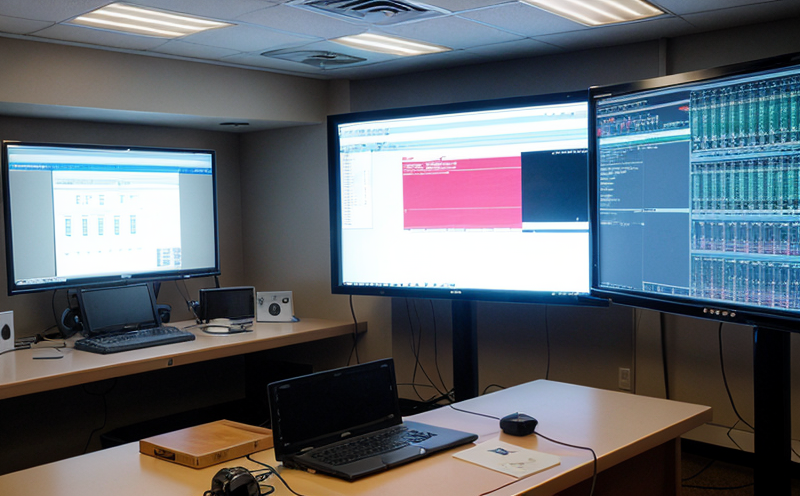EN 50159 Cybersecurity Testing of Railway Signaling Networks
The European standard EN 50159:2014 provides a framework for the cybersecurity testing of railway signaling networks. This service ensures that critical infrastructure in the transportation sector meets stringent security requirements, safeguarding against cyber-attacks and ensuring reliable operation.
Railway signaling systems are pivotal to the safe and efficient operation of trains. These systems manage train movements by providing signals or instructions. As with any networked system, railway signaling networks face increasing threats from malicious actors. EN 50159 aims to protect these systems against unauthorized access, data corruption, and other cyber threats that could disrupt operations.
The standard is designed for testing the security of signaling equipment used in railways, including but not limited to automatic train protection (ATP), automatic train operation (ATO), and interlocking systems. It covers both hardware and software components involved in railway signaling networks. The testing process ensures compliance with international best practices, thereby enhancing the overall security posture of railway infrastructure.
EN 50159 defines a series of tests to be conducted on signaling equipment to ensure they meet specified security requirements. These tests are designed to assess various aspects of cybersecurity, including:
- Authentication
- Encryption
- Data integrity
- Access control
- Network segmentation
- Anomaly detection
The standard provides detailed guidelines on how each test should be conducted and the criteria against which results will be evaluated. Compliance with these tests ensures that railway signaling networks are secure, reliable, and resilient to cyber threats.
In addition to the above, EN 50159 also emphasizes the importance of a holistic approach to cybersecurity. This includes not only technical measures but also organizational processes such as incident response planning and staff training. The standard encourages continuous improvement in security practices through regular audits and updates.
Our laboratory is equipped with state-of-the-art facilities and experienced professionals who can perform EN 50159 compliance testing for railway signaling networks. Our services are tailored to meet the specific needs of our clients, ensuring that they comply with international standards while enhancing their operational security. Whether you require initial assessment or ongoing support, we offer comprehensive solutions.
To summarize, EN 50159 cybersecurity testing is essential for protecting critical infrastructure in the railway sector. By adhering to this standard, organizations can ensure the security of their signaling networks and maintain a high level of safety and efficiency. Our laboratory provides expert services to help you achieve compliance with these stringent requirements.
Applied Standards
| Standard Name | Description |
|---|---|
| EN 50159:2014 | Cybersecurity requirements for signaling systems in railway applications. |
| ISO/IEC 27001 | International standard on information security management systems. |
| IEC 62287-3:2014 | Technical specification for the design and operation of signaling systems in railway applications. |
The EN 50159 standard is complemented by other international standards such as ISO/IEC 27001, which provides best practices for information security management systems. IEC 62287-3:2014 offers additional technical specifications that are relevant to the design and operation of signaling systems in railway applications.
Our laboratory ensures compliance with all these standards during our testing processes. By adhering strictly to these guidelines, we provide clients with peace of mind knowing their products meet global best practices for cybersecurity.
Environmental and Sustainability Contributions
The railway sector plays a crucial role in promoting sustainable transportation solutions. By ensuring the security of signaling networks, our EN 50159 testing contributes to the safe and efficient operation of railways, which can help reduce carbon emissions by optimizing train movements.
Railways are generally more energy-efficient than road transport for long-distance travel. By enhancing the reliability and safety of railway systems through cybersecurity measures, we support a greener transportation future. Our laboratory’s commitment to environmental sustainability is reflected in our approach to testing, which aims to minimize waste and promote efficient use of resources.
Furthermore, by protecting critical infrastructure against cyber threats, EN 50159 testing helps prevent disruptions that could lead to increased fuel consumption or other negative impacts on the environment. Our services contribute to a more resilient and sustainable railway sector, ensuring long-term benefits for both society and the planet.
Use Cases and Application Examples
- ATP Systems: Testing of ATP systems ensures they can withstand cyberattacks without compromising safety or reliability.
- ATO Systems: ATO systems are tested for secure communication channels to prevent unauthorized control over trains.
- Interlocking Systems: Interlocking systems are crucial for safe train operations. Testing their security helps prevent accidents and disruptions.
- Remote Management: Remote management capabilities must be thoroughly tested to ensure they do not introduce vulnerabilities into the signaling network.
- Data Integrity: Ensuring data integrity is vital for maintaining accurate information flow in railway systems, preventing unauthorized modifications.
These use cases highlight the importance of cybersecurity testing in protecting critical infrastructure. By addressing these areas, our laboratory ensures that railway signaling networks are robust and resilient against cyber threats.





